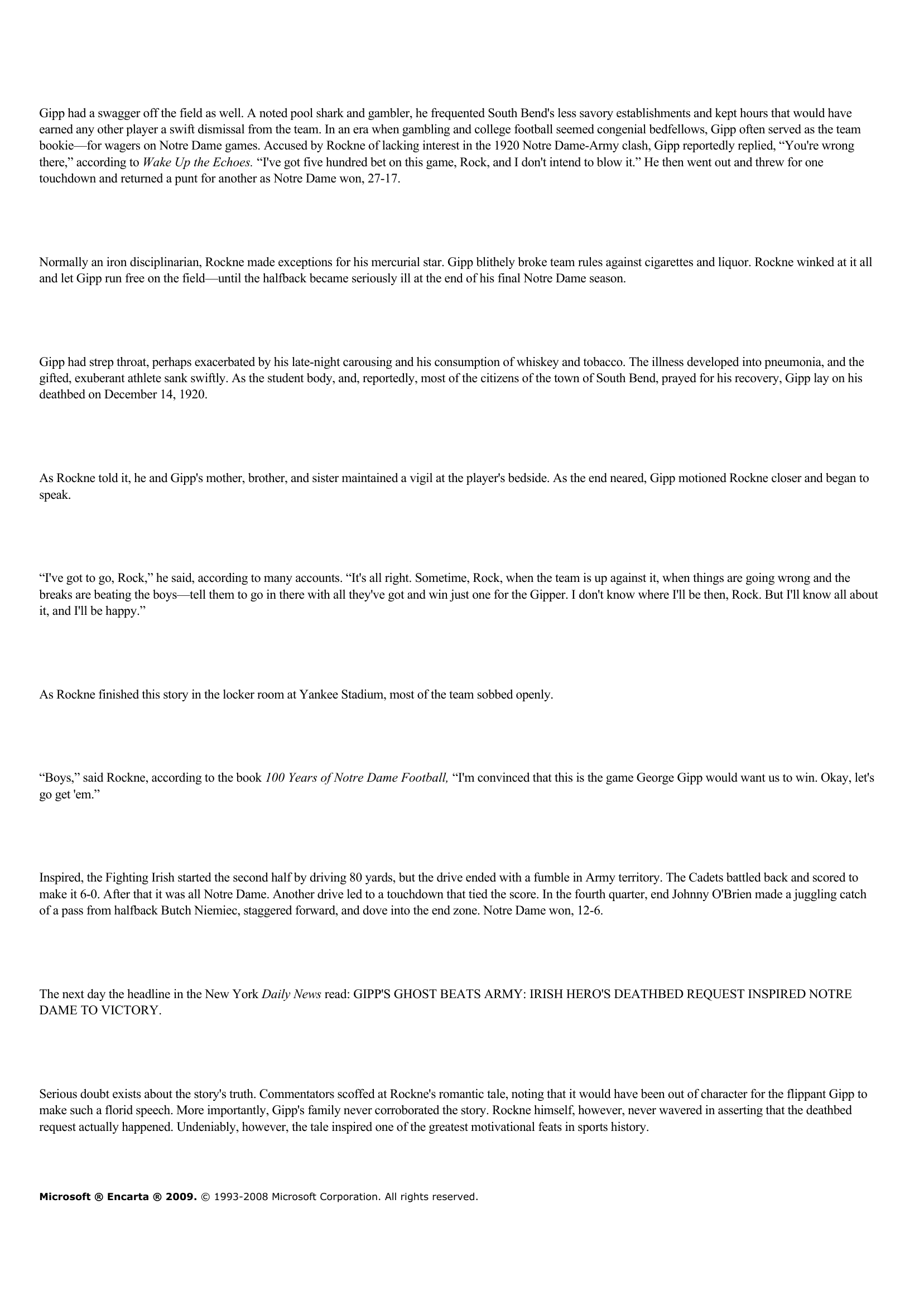Winning One for the Gipper.
Publié le 14/05/2013

Extrait du document
«
Gipp had a swagger off the field as well.
A noted pool shark and gambler, he frequented South Bend's less savory establishments and kept hours that would haveearned any other player a swift dismissal from the team.
In an era when gambling and college football seemed congenial bedfellows, Gipp often served as the teambookie—for wagers on Notre Dame games.
Accused by Rockne of lacking interest in the 1920 Notre Dame-Army clash, Gipp reportedly replied, “You're wrongthere,” according to Wake Up the Echoes.
“I've got five hundred bet on this game, Rock, and I don't intend to blow it.” He then went out and threw for one touchdown and returned a punt for another as Notre Dame won, 27-17.
Normally an iron disciplinarian, Rockne made exceptions for his mercurial star.
Gipp blithely broke team rules against cigarettes and liquor.
Rockne winked at it alland let Gipp run free on the field—until the halfback became seriously ill at the end of his final Notre Dame season.
Gipp had strep throat, perhaps exacerbated by his late-night carousing and his consumption of whiskey and tobacco.
The illness developed into pneumonia, and thegifted, exuberant athlete sank swiftly.
As the student body, and, reportedly, most of the citizens of the town of South Bend, prayed for his recovery, Gipp lay on hisdeathbed on December 14, 1920.
As Rockne told it, he and Gipp's mother, brother, and sister maintained a vigil at the player's bedside.
As the end neared, Gipp motioned Rockne closer and began tospeak.
“I've got to go, Rock,” he said, according to many accounts.
“It's all right.
Sometime, Rock, when the team is up against it, when things are going wrong and thebreaks are beating the boys—tell them to go in there with all they've got and win just one for the Gipper.
I don't know where I'll be then, Rock.
But I'll know all aboutit, and I'll be happy.”
As Rockne finished this story in the locker room at Yankee Stadium, most of the team sobbed openly.
“Boys,” said Rockne, according to the book 100 Years of Notre Dame Football, “I'm convinced that this is the game George Gipp would want us to win.
Okay, let's go get 'em.”
Inspired, the Fighting Irish started the second half by driving 80 yards, but the drive ended with a fumble in Army territory.
The Cadets battled back and scored tomake it 6-0.
After that it was all Notre Dame.
Another drive led to a touchdown that tied the score.
In the fourth quarter, end Johnny O'Brien made a juggling catchof a pass from halfback Butch Niemiec, staggered forward, and dove into the end zone.
Notre Dame won, 12-6.
The next day the headline in the New York Daily News read: GIPP'S GHOST BEATS ARMY: IRISH HERO'S DEATHBED REQUEST INSPIRED NOTRE DAME TO VICTORY.
Serious doubt exists about the story's truth.
Commentators scoffed at Rockne's romantic tale, noting that it would have been out of character for the flippant Gipp tomake such a florid speech.
More importantly, Gipp's family never corroborated the story.
Rockne himself, however, never wavered in asserting that the deathbedrequest actually happened.
Undeniably, however, the tale inspired one of the greatest motivational feats in sports history.
Microsoft ® Encarta ® 2009. © 1993-2008 Microsoft Corporation.
All rights reserved..
»
↓↓↓ APERÇU DU DOCUMENT ↓↓↓
Liens utiles
- Virgo (Virgin) Greek One of the constellations; sixth sign of the Zodiac, named for the maiden Erigone, who hanged herself from a tree after finding the grave of her murdered father, Icarius of Attica.
- Dante Alighieri I INTRODUCTION Dante Alighieri (1265-1321), Italian poet, and one of the supreme figures of world literature, who was admired for the depth of his spiritual vision and for the range of his intellectual accomplishment.
- Marvin Gaye Marvin Gaye (1939-1984), American singer and songwriter, a recording artist for Motown Records, and one of the most popular and influential singers of rhythm-andblues music (R&B) in the 1960s and 1970s.
- LE DISCOURS D’UN ROIFrançais Anglais In the first instance, i’m going to recapitulate the movie for those of you who don’t know.
- CHER DISPARU (Le) [The Loved One]. Evelyn Waugh


